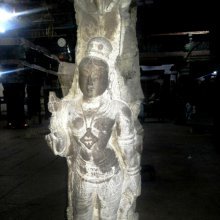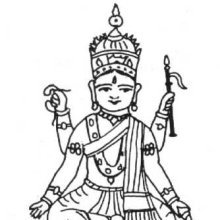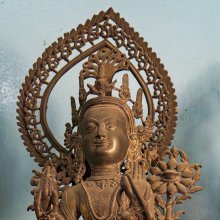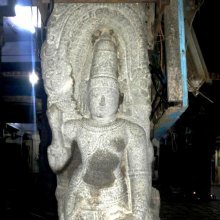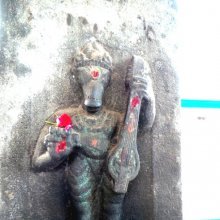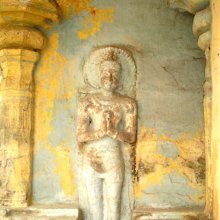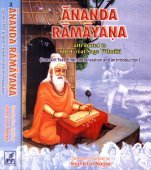Gandharva, Gāndharva, Gamdharva, Gamdharvadurve: 43 definitions
Introduction:
Gandharva means something in Buddhism, Pali, Hinduism, Sanskrit, Jainism, Prakrit, the history of ancient India, Marathi. If you want to know the exact meaning, history, etymology or English translation of this term then check out the descriptions on this page. Add your comment or reference to a book if you want to contribute to this summary article.
Gandharva has 43 English definitions available.
Images (photo gallery)
(+3 more images available)
Languages of India and abroad
Sanskrit dictionary
[Deutsch Wörterbuch]
Source: Cologne Digital Sanskrit Dictionaries: Böhtlingk and Roth Grosses Petersburger WörterbuchGandharva (गन्धर्व):—
--- OR ---
Gāndharva (गान्धर्व):—(von gandharva)
1) adj. f. gāndharvī gandharvisch: rūpa [The Śatapathabrāhmaṇa 14, 7, 2, 5.] a.nirgāndharvīṃ pa.hyāmṛ.asyā.nergavyūtirghṛ.a ā niṣattā [Ṛgveda 10, 80, 6.] aśva [Mahābhārata 1, 8183.] yuddha [7, 6348.] astra [Rāmāyaṇa 1, 29, 15. 56, 7. 3, 31, 46.] [Arjunasamāgama 7, 20.] loka [Bhāgavatapurāṇa 9, 14, 49.] vivāha und vidhi die g. Eheform, nach der sich das liebende Paar ohne alle Cerimonien verbindet, [ĀŚV. GṚHY. 1, 6.] [Manu’s Gesetzbuch 3, 21. 26. 32. 9, 196.] [Yājñavalkya’s Gesetzbuch 1, 61.] [Mahābhārata 1, 2958.] [Śākuntala 71. 110. 14.] [Pañcatantra 45, 6. 129. 9.] [Kathāsaritsāgara 6, 14. 15, 44.] [Geschichte des Vidūṣaka 152.] zu den Gandharva als himmlischen Sängern in Bezug stehend: gandharvāścopagāyanti gāndharveṇa svareṇa [Harivaṃśa 16291.] vāditra [Indralokāgamana 3, 10.] hāryo yaṃ viṣayo gāndharvo nāma nāmataḥ [Mahābhārata 13, 1429.] gāndharvakalāḥ Gesang, Musik [Gītagovinda 12, 28.] gāndharvo vedaḥ, gāndharvaveda Musik-Veda, die Musikwissenschaft; wird im System dem [SĀMAVEDA] als Anhang zugetheilt und dem Bharata als Verfasser zugeschrieben, [Madhusūdanasarasvatī’s Prasthānabheda] in [Weber’s Indische Studien 1, 13. 22. 2, 67. 3, 280.] [Akademische Vorlesungen 239.] [Mahābhārata 3, 8421.] [Harivaṃśa 3049.] [Viṣṇupurāṇa 284.] [Bhāgavatapurāṇa 3, 12, 38.] gāndharvaśāstra [Mahābhārata 13, 5103.] Daher gāndharva n. die Kunst der Gandharva. Gesang ( [Hemacandra’s Abhidhānacintāmaṇi 280]), Musik, Tanz: pravṛtte gāndharve divye [Mahābhārata 13, 1427.] āvartamāne gāndharve [Bhāgavatapurāṇa 9, 3, 30.] gāndharvaṃ nārado veda [Mahābhārata 12, 7662.] sa ca gāndharvamakhilaṃ grāhayāmāsa mām [Arjunasamāgama 4, 58.] gāndharvajña [Kathāsaritsāgara 11, 11.] gāndharvatattvajña [Rāmāyaṇa 1, 4, 11.] [Varāhamihira’s Bṛhajjātaka S. 15, 12. 16, 18.] chālikyagāndharvam [Harivaṃśa 8455. fgg.] gāndharvajāti [8461.] yuddhagāndharva Kriegstanz [Rāmāyaṇa 6, 28, 26.] [Lassen’s Indische Alterthumskunde II, 958, Nalopākhyāna 1.] —
2) m. a) = gandharva [Hemacandra’s Abhidhānacintāmaṇi 183.] Sänger überh. [Varāhamihira’s Bṛhajjātaka S. 15, 3. 31 (30), 11.] — b) Nomen proprium eines Volkes im Nordosten von Madhyadeśa [Varāhamihira’s Bṛhajjātaka S. 14, 31.] —
3) f. a) = vāc Rede [das 1, 11.] nach der bekannten Legende, dass die Götter von den Gandharva um die Vāk den Soma erhandelt haben, z. B. [Aitareyabrāhmaṇa 1, 27.] — b) Beiname der Durgā [Hemacandra’s Abhidhānacintāmaṇi 53.] [Harivaṃśa 10243.] —
4) n. a) die Kunst der Gandharva. s. u. 1. — b) Name eines der 9 Abtheilungen von Bhāratavarṣa (vgl. gandharvakhaṇḍa) [Viṣṇupurāṇa 175.]
--- OR ---
Gandharva (गन्धर्व):—
1) b) γ) [Z. 1] lies (rohiṇīṃ) . — ζ) [?Z. 6 lies ŚUK. Stenzler Śākuntala] —
2) d) [Mahābhārata 3, 11762] fasst [Nīlakaṇṭha] das Wort in der Bed. Pferd. —
4) pl. Nomen proprium eines Volkes, das neben den Gāndhāra auftritt und dessen Hauptstadt Takṣaśilā auch in das Land der Gāndhāra gesetzt wird. [Rāmāyaṇa 7, 100, 11. 101, 2. 4.] deśa [11.] viṣaya [100, 10]; vgl. gandharvanagara und gandharvapura . —
5) Name eines Kalpa (Weltperiode), des 14ten Tages Brahman's, [Oxforder Handschriften 52,a,1]; vgl. garuḍa [3]). — Etymologie des Namens [Mārkāṇḍeyapurāṇa 48, 23. fg.]
--- OR ---
Gāndharva (गान्धर्व):—
1) adj. māyā [Bhāgavatapurāṇa 10, 55, 23.] n.: gāndharvaṃ śrotum [Rāmāyaṇa.7,23,50. 94,11.] [Kathāsaritsāgara 106,11. fg. 15.] [Oxforder Handschriften 339,a,1 v. u.] śāstra [122,b,27.] gāndharvādyupavedeṣu [265,b,22.] gāndharvaṃ gānamityasya (gītasya) bhedadvayamudīritam [199,b, No. 472.] Name eines Tantra [95,a,27. 101,b,32. 103,b,44]; vgl. gandharvatantra . [Sp. 734, Z. 8] streiche Tanz; [Z. 12] lies Schlachtmusik st. Kriegstanz. In yuddhagāndharvasevin [Mahābhārata 2, 143] fasst [Nīlakaṇṭha] yuddhagāndharva als Schlacht und Musik. —
2) a) [Rāmāyaṇa 7, 94, 6.] = saṃgītaśāstrajña [Scholiast]
Source: Cologne Digital Sanskrit Dictionaries: Sanskrit-Wörterbuch in kürzerer FassungGandharva (गन्धर्व):——
1) m. (adj. Comp. f. ā) — a) Nomen proprium — α) eines in nächster Beziehung zum Soma und zur Sonne stehenden Genius. Von ihm stammt das erste Menschenpaar , und auf das Weib besitzt er besondere Anrechte. Auch Pl. Ihre Weiber sind die Apsaras. Im Epos sind sie die himmlischen Sänger und gehören mit dem Apsaras zum Hofstaat Indra's. — β) Pl. eines Volkes. — γ) *des Dieners des 17ten Arhant’s der Jaina. — b) Sänger. — c) *Weiser , frommer Mann. — d) *der indische Kuckuck. — e) Pferd. — f) *Bisamthier. — g) *die Seele nach dem Tode , bevor sie in einen neuen Körper einzieht. — h) Bez. des 14ten Kalpa 2)h). — i) Bez. des 21ten Muhūrta [Indische studien von Weber 10,296.] — k) ein best. Svara [Harivaṃśa 3,132,53.] gāndharva v.l. , richtig wohl gāndhāra. —
2) f. ā Beiname der Durgā [Harivaṃśa 2,120,4.] gāndharvī v.l. —
3) f. ī f. zu
1) a). Sie ist die Urmutter der Pferde.
--- OR ---
Gāndharva (गान्धर्व):——
1) Adj. (f. gāndharvī) gandharvisch. vivāha m. und vidhi (compon. [116,21]) m. Bez. einer ohne alle Ceremonie vollzogenen Ehe. —
2) m. — a) Sänger. — b) eine best. musikalische Note [Harivaṃśa 16291.] gandharva. v.l. Vielleicht gāndhāra gemeint. — c) Nomen proprium — α) Pl. eines Volkes. — β) eines Theiles von Bhāratavarṣa [Wilson's Uebersetzung des Viṣṇupurāṇa ,3,7.] —
3) f. gāndharvī — a) *Rede. — b) Beiname der Durgā. gandharvā v.l. — c) Nomen proprium einer Apsaras [VP.².,2,82.] —
4) n. — a) die Kunst der Gandharva , Musik , Gesang. — b) Titel eines Tantra.
Sanskrit, also spelled संस्कृतम् (saṃskṛtam), is an ancient language of India commonly seen as the grandmother of the Indo-European language family (even English!). Closely allied with Prakrit and Pali, Sanskrit is more exhaustive in both grammar and terms and has the most extensive collection of literature in the world, greatly surpassing its sister-languages Greek and Latin.
See also (Relevant definitions)
Starts with (+42): Gamdharvagaruke, Gamdharvajna, Gamdharvamsha, Gamdharvasrishti, Gamdharvavidye, Gandharva-vidhya, Gandharvachitta, Gandharvacitta, Gandharvadatta, Gandharvagana, Gandharvagayana, Gandharvagita, Gandharvagraha, Gandharvagrihita, Gandharvahasta, Gandharvahastadi, Gandharvahastaka, Gandharvahastakah, Gandharvaka, Gandharvakala.
Ends with: Devagandharva, Mahagandharva, Manushyagandharva, Sagandharva, Samigandharva, Sarvagandharva, Tantragandharva, Upagandharva, Yuddhagandharva.
Full-text (+1058): Gandharvaveda, Vishvavasu, Gandharvavidya, Gandharvavivaha, Gandharvacitta, Huhu, Gandharvaraja, Tumburu, Yuddhagandharva, Citrasena, Padmashekhara, Gandharvakala, Caitraratha, Gandharvaka, Devagandharva, Citraratha, Gandharvagrihita, Manojnasvara, Gandharvapsaras, Manushyagandharva.
Relevant text
Search found 216 books and stories containing Gandharva, Gamdharva, Gaṃdharva, Gāṃdharva, Gamdharvadurve, Gaṃdharvadūrve, Gāndharva, Gandharvā, Gandharvadurve, Gandharvadūrve; (plurals include: Gandharvas, Gamdharvas, Gaṃdharvas, Gāṃdharvas, Gamdharvadurves, Gaṃdharvadūrves, Gāndharvas, Gandharvās, Gandharvadurves, Gandharvadūrves). You can also click to the full overview containing English textual excerpts. Below are direct links for the most relevant articles:
Women in the Atharva-veda Samhita (by Pranab Jyoti Kalita)
2. Goddess Apsarases < [Chapter 4 - Female Deities and the Glorification of Women in the Atharvaveda]
2. Hymns to Obtain a Husband < [Chapter 2 - The Strīkarmāṇi Hymns of the Atharvaveda]
5e. Practice of Polygamy and Polyandry < [Chapter 3 - The Familial and Social Life of Women in the Atharvaveda]
Garga Samhita (English) (by Danavir Goswami)
Verse 5.8.45 < [Chapter 8 - The Killing of Kaṃsa]
Verses 1.11.22-24 < [Chapter 11 - Description of Śrī Kṛṣṇacandra’s Birth]
Verse 4.9.12 < [Chapter 9 - The Glories of Srī Ekādaśī]
Rivers in Ancient India (study) (by Archana Sarma)
3c. The Legend of Vāk in the Aitareya-brāhmaṇa < [Chapter 3 - The Rivers in the Brāhmaṇa Literature]
3d. The legend of Vāk in the Śatapatha-brāhmaṇa < [Chapter 3 - The Rivers in the Brāhmaṇa Literature]
6. The river Narmadā in the Purāṇas < [Chapter 5 - Rivers in the Purāṇic Literature]
Gati in Theory and Practice (by Dr. Sujatha Mohan)
References to drama, dance and music in Sanskrit literature < [Chapter 1 - Nāṭya]
Gati in aerial sphere < [Chapter 3 - Application of gati in Dṛśya-kāvyas]
Analysis of technical terms: Nāṭya, Nṛtta, Nṛtya < [Chapter 1 - Nāṭya]
Rig Veda (translation and commentary) (by H. H. Wilson)
The Markandeya Purana (Study) (by Chandamita Bhattacharya)
Forms of Marriage < [Chapter 2]
Divisions of Āśrama (Introduction) < [Chapter 2]
Related products
